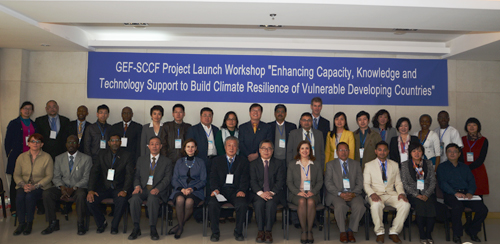New GEF-SCCF Project Launches on Ecosystem-Based Adaptation in Developing Countries
April 22, 2013, Beijing: The project titled “Enhancing capacity, knowledge and technology support to build climate resilience of vulnerable developing countries” was officially launched on April 22, 2013 in Beijing, China. The project seeks to build climate resilience using ecosystem-based approaches in three pilot countries, Mauritania (desert ecosystems), Nepal (mountain ecosystems) and Seychelles (coastal ecosystems), by increasing institutional capacity, mobilizing knowledge, and transferring appropriate adaptation technologies, and sharing knowledge of such kind across Africa and Asia-Pacific. The project is funded through the Global Environment Facility – Special Climate Change Fund (GEF-SCCF) in collaboration with the National Development and Reform Commission of China (NDRC), the United Nations Environment Programme (UNEP), and the Chinese Academy of Sciences (CAS). The launch was attended by dignitaries from GEF, NDRC, UNEP, CAS, UN Resident Coordinator Office, UNDP, and China’s Ministry of Finance (MOF), regional representatives from the African Climate Change Policy Centre (ACPC) and the Asia-Pacific Adaptation Network, as well as senior government representatives from Mauritania, Nepal and Seychelles.
The workshop was opened by Dr. LIU Jian, director of UNEP-International Ecosystem Management Partnership (UNEP-IEMP) who welcomed participants and made a quick introduction to the project. In his opening remarks, Mr. SU Wei, director General of NDRC, noted that climate change is one of the most pressing challenges facing humanity in the 21st century. He called for joint efforts by the international community in mainstreaming climate change actions in the overall framework of sustainable development and envisages that this project will become a flagship in South-South Cooperation on climate change. His comments were further reiterated by Mr. LIANG Ziqian, deputy director General of the Department of International Cooperation, MOF who noted China’s willingness to share their lessons and experiences with other developing countries and international community within the framework of South-South Cooperation. Ms. Renata Lok-Desallien, UN China Resident Coordinator, in her opening remarks, stressed the need for effective action to go beyond national borders to include both regional and international action and as such, South-South Cooperation can play a key role. Ms. Bonizella Biagini, Head, Climate Change Adaptation Strategy and Operations of the GEF commended the project for its innovative and integrated approach to dealing with adaptation and the partnership that China has developed in addressing climate change issues. Ms. Ermira Fida, Head, GEF Adaptation Portfolio of UNEP said that while this project complements the big picture of the UNEP’s Ecosystem-Based Adaptation Flagship Programme, it is the first GEF adaptation project which follows the newly developed GEF guidelines for Ecosystem-Based Adaptation projects. The project is expected to deliver tools, methods and platforms for use by other developing countries as they advance their National Adaptation Planning.
First day of the workshop focused on the human dimension of climate change which includes capacity building, planning and implementation of Ecosystem-Based Adaptation. National and regional activities including an implementation plan for each pilot country were the areas of discussion on the second day. Final day of the workshop concluded with a wrap-up of key findings and recommendations from the full workshop deliberations.
The launch was co-organized by UNEP-International Ecosystem Management Partnership (UNEP-IEMP) and the Institute of Geographic Sciences and Natural Resources Research, Chinese Academy of Sciences (IGSNRR, CAS).
 |
| attendees |
For more information, contact: Karen.Mrema@unep-iemp.org
Download attachments: